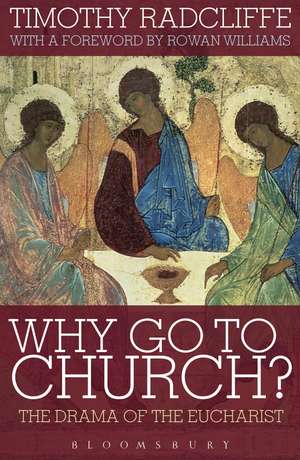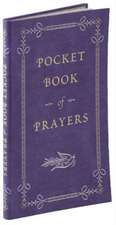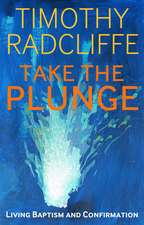Why Go to Church?: The Drama of the Eucharist
Autor Timothy Radcliffe, OPen Limba Engleză Paperback – 11 apr 2008
Preț: 69.25 lei
Preț vechi: 114.65 lei
-40% Nou
Puncte Express: 104
Preț estimativ în valută:
13.25€ • 13.83$ • 10.97£
13.25€ • 13.83$ • 10.97£
Carte tipărită la comandă
Livrare economică 04-18 aprilie
Preluare comenzi: 021 569.72.76
Specificații
ISBN-13: 9780826499561
ISBN-10: 0826499562
Pagini: 224
Dimensiuni: 129 x 198 x 18 mm
Greutate: 0.16 kg
Editura: Bloomsbury Publishing
Colecția Continuum
Locul publicării:London, United Kingdom
ISBN-10: 0826499562
Pagini: 224
Dimensiuni: 129 x 198 x 18 mm
Greutate: 0.16 kg
Editura: Bloomsbury Publishing
Colecția Continuum
Locul publicării:London, United Kingdom
Caracteristici
Chosen by Rowan Williams to write his Lent Book, this selection is a matter of great significance
Cuprins
Foreword by The Archbishop of CanterburyIntroductionThe Confession of SinsThe Glory of GodThe Holiness of GodThe Breaking of the BodyLamb of GodThanksgiving
Recenzii
Title mention in Christian Marketplace.
A Tablet Book of the Year 2008
"A beautiful and often piercing meditation on the meaning of the Mass for human living ... Throughout the book, Radcliffe lightens and enriches his writing with insights drawn from remarkably wide and eclectic reading." - Tablet
Review in Daily Telegraph.
Launch mentioned in Daily Telegraph blog http://blogs.telegraph.co.uk/news/georgepitcher/8744047/Cardinal_Cormac_Life_in_the_old_dog_yet/
'[Radcliffe] has the rare gift of showing the familiar and obvious and boringly churchy to be all-important and exciting.' Oldie, April 2009
Review in Methodist Recorder, February 2009
Mention in Church Times, January 2009
Mention - Baptist Times, February 2009
"This book offers the reader so much more than a treatise on why they should get out of bed on a Sunday to go to Church: Radcliffe calls us to recognise the Eucharist as 'The unobserved drama [which] is in the core of our humanity'... I found that after reading this book, the Mass was much more accessible to me ... I found his confidence reassuring and his use of day-to-day examples helpful. He successful shows us that we are 'at home' with God and that the drama of the Eucharist is played out in order to draw us more closely into relationship with God. Radcliffe's book is not a polemic on why we should attend Church, nor is it an exercise in apologetics for aspects of Eucharistic experience: it manages to speak respectfully of the frustrations, confusion and hope experienced by many people who attend Church... It is certainly a book I will share with others, return to and continue to explore... this book has given me the tools to re-examine where I fit in." - Angela Kitching, Thinking Faith, April 2009.
"This is an important and innovative treatment of the celebration of the symbolic sacrificial meal at the center of Christian Worship. Radcliffe provides an accessible but profoundly devout treatment of the experience of Eucharistic worship. With a foreword by Rowan Williams. Recommended for most collections." - Library Journal, January 2009
"Radcliffe's book is on the drama of the Eucharist in three acts - faith, hope, and charity - each preparing for the next. 'If we can understand one another's faith, hope and charity better, with the grace of God,' Radcliffe says, Christian eventually may come to share the Eucharist, too...As we experience the Eucharist together, it forms us as people who believe and have hope and charity. 'The liturgy,' he writes, 'works in the depths of our minds and hearts a very gradual, barely perceptible transformation of who we are, so quietly that we might easily think that nothing is happening at all.' We may not realize our consistent need to be there, experiencing this grace from God for our own comfort, growth and sending out...Using the words and stories of the Scriptures, with examples from history and culture, Radcliffe walks readers through the Eucharist: the word of God, the homily, the creed, the prayers, the peace, the offertory, the Eucharistic prayers, the bread and wine, the sending out...Why do we go to Church? To express our faith in God, to be part of the community of hope and together to be sent out to be witness of God's love." -Lois Sibley, EpiscopalLife, February 2009
'A rich but digestible helping of Christian thought' Rupert Shortt, The Times, February 2009
Book launch mentioned in The Observer.
"This is one of the finest expositions of the meaning of the eucharist that I have read. This is no dry textbook: Radcliffe fills his pages with stories of people who have crossed his path all over the world" - Peter McGeary, Church Times
"Shows the reader how relevant the Eucharist is to their everyday experience, and in doing so raises these experiences to holiness ... Radcliffe should consider it a triumph that this book reaches beyond the pulpit and speaks to the reader throughout the Eucharistic celebration. It is certainly a book I will share with others, return to and continue to explore." - Thinking Faith
"Radcliffe writes as a believer, for believers....Why Go to Church? Is a mix of Eucharistic theology, commentary and spiritual reflection stimulated by the various parts of the Mass. Overall, it is more than an extended meditation than a theological treatise. It shows the subtle art of a seasoned preacher who knows how to invite his audience into the happenings of grace by telling a story, reciting a poem, relating an experience or making a point with humor or a well-chosen quote...Radcliffe's meditation on the Eucharist can be inspiring reading for preachers and teachers." - America: The National Catholic Weekly
"Why Go To Church should be required reading for anyone who has ever felt the urge not to attend a Sunday Eucharist or who has ever confessed inattentiveness, ambivalence, or boredom with the Mass. This insightful and pastorally sound book will reintroduce the reader to the fundamental value and joy of actively participating in the daily or weekly gathering of God's people.... This helpful commentary, filled with touching stories and real life occurrences, will certainly bring new insights and renewed enthusiasm for our most traditional form of prayer.... This title is recommended for parish libraries and personal reflection." --John-Leonard Berg, Catholic Library World
"The engagingly expressed thesis of the book is that the Eucharist is a drama in three acts, linked to faith, hope and charity (love)..."[Going to church] is not merely a big subject, it is the central point of Christianity..." Christopher Howse, The Daily Telegraph
"It is accessible, fresh in approachand thought provoking. Offering a refreshingly new way of comprehending the structure, flow and inner dynamism of the Eucharistic Liturgy, this book is a must for those who would incline to propose a Christian Spirituality which is devoid of any communal aspect. It is also essential reading for those who struggle to understand the relevance or necessity of common prayer, liturgy and ritual. It will prove inspirational for those who seek to deepen their understanding of the Eucharistic Celebration" The Furrow, Journal for the contemporary church, June 2009
"Why go to Church? has become something of a publishing phenomenon in the past few months.. Timothy Radcliffewas described as 'the Archbishop of Canter-bury's favourite theologian' ...an Ulster orangemen was overhad saying that it was one of the best talks he had ever heard" this is a fine book, especially to be recommended to the intelligent avarage reader" Vol 5 Issue 3
"In the face of our 'spiritual but not religious' and institution-wary culture, Timothy Radcliffe, the English Dominican, explains why going to church is so much more than participating in an archaic tradition. In this book, Radcliffe explores how the Eucharist recreates the drama of human existence, which unfolds slowly throughout our life....he is careful to separate our faith from our society's emphasis on individualism and consumerism...Radcliffe uses popular culture and spiritual writings to try to reconnect us with our core, our intimate relationship with God through the Eucharist and through the community of believers. This is why we go to church." - U.S. Catholic
"Radcliffe packs each paragraph with so much information that you have to read the book slowly to take everything in. But this is not a complex tome, nor is it a trivial self-help book on personal spirituality. Radcliffe uses popular culture and spiritual writings to try to reconnect us with God through the Eucharist and through the community of believers. This is why we go to church." --US Catholic
A Tablet Book of the Year 2008
"A beautiful and often piercing meditation on the meaning of the Mass for human living ... Throughout the book, Radcliffe lightens and enriches his writing with insights drawn from remarkably wide and eclectic reading." - Tablet
Review in Daily Telegraph.
Launch mentioned in Daily Telegraph blog http://blogs.telegraph.co.uk/news/georgepitcher/8744047/Cardinal_Cormac_Life_in_the_old_dog_yet/
'[Radcliffe] has the rare gift of showing the familiar and obvious and boringly churchy to be all-important and exciting.' Oldie, April 2009
Review in Methodist Recorder, February 2009
Mention in Church Times, January 2009
Mention - Baptist Times, February 2009
"This book offers the reader so much more than a treatise on why they should get out of bed on a Sunday to go to Church: Radcliffe calls us to recognise the Eucharist as 'The unobserved drama [which] is in the core of our humanity'... I found that after reading this book, the Mass was much more accessible to me ... I found his confidence reassuring and his use of day-to-day examples helpful. He successful shows us that we are 'at home' with God and that the drama of the Eucharist is played out in order to draw us more closely into relationship with God. Radcliffe's book is not a polemic on why we should attend Church, nor is it an exercise in apologetics for aspects of Eucharistic experience: it manages to speak respectfully of the frustrations, confusion and hope experienced by many people who attend Church... It is certainly a book I will share with others, return to and continue to explore... this book has given me the tools to re-examine where I fit in." - Angela Kitching, Thinking Faith, April 2009.
"This is an important and innovative treatment of the celebration of the symbolic sacrificial meal at the center of Christian Worship. Radcliffe provides an accessible but profoundly devout treatment of the experience of Eucharistic worship. With a foreword by Rowan Williams. Recommended for most collections." - Library Journal, January 2009
"Radcliffe's book is on the drama of the Eucharist in three acts - faith, hope, and charity - each preparing for the next. 'If we can understand one another's faith, hope and charity better, with the grace of God,' Radcliffe says, Christian eventually may come to share the Eucharist, too...As we experience the Eucharist together, it forms us as people who believe and have hope and charity. 'The liturgy,' he writes, 'works in the depths of our minds and hearts a very gradual, barely perceptible transformation of who we are, so quietly that we might easily think that nothing is happening at all.' We may not realize our consistent need to be there, experiencing this grace from God for our own comfort, growth and sending out...Using the words and stories of the Scriptures, with examples from history and culture, Radcliffe walks readers through the Eucharist: the word of God, the homily, the creed, the prayers, the peace, the offertory, the Eucharistic prayers, the bread and wine, the sending out...Why do we go to Church? To express our faith in God, to be part of the community of hope and together to be sent out to be witness of God's love." -Lois Sibley, EpiscopalLife, February 2009
'A rich but digestible helping of Christian thought' Rupert Shortt, The Times, February 2009
Book launch mentioned in The Observer.
"This is one of the finest expositions of the meaning of the eucharist that I have read. This is no dry textbook: Radcliffe fills his pages with stories of people who have crossed his path all over the world" - Peter McGeary, Church Times
"Shows the reader how relevant the Eucharist is to their everyday experience, and in doing so raises these experiences to holiness ... Radcliffe should consider it a triumph that this book reaches beyond the pulpit and speaks to the reader throughout the Eucharistic celebration. It is certainly a book I will share with others, return to and continue to explore." - Thinking Faith
"Radcliffe writes as a believer, for believers....Why Go to Church? Is a mix of Eucharistic theology, commentary and spiritual reflection stimulated by the various parts of the Mass. Overall, it is more than an extended meditation than a theological treatise. It shows the subtle art of a seasoned preacher who knows how to invite his audience into the happenings of grace by telling a story, reciting a poem, relating an experience or making a point with humor or a well-chosen quote...Radcliffe's meditation on the Eucharist can be inspiring reading for preachers and teachers." - America: The National Catholic Weekly
"Why Go To Church should be required reading for anyone who has ever felt the urge not to attend a Sunday Eucharist or who has ever confessed inattentiveness, ambivalence, or boredom with the Mass. This insightful and pastorally sound book will reintroduce the reader to the fundamental value and joy of actively participating in the daily or weekly gathering of God's people.... This helpful commentary, filled with touching stories and real life occurrences, will certainly bring new insights and renewed enthusiasm for our most traditional form of prayer.... This title is recommended for parish libraries and personal reflection." --John-Leonard Berg, Catholic Library World
"The engagingly expressed thesis of the book is that the Eucharist is a drama in three acts, linked to faith, hope and charity (love)..."[Going to church] is not merely a big subject, it is the central point of Christianity..." Christopher Howse, The Daily Telegraph
"It is accessible, fresh in approachand thought provoking. Offering a refreshingly new way of comprehending the structure, flow and inner dynamism of the Eucharistic Liturgy, this book is a must for those who would incline to propose a Christian Spirituality which is devoid of any communal aspect. It is also essential reading for those who struggle to understand the relevance or necessity of common prayer, liturgy and ritual. It will prove inspirational for those who seek to deepen their understanding of the Eucharistic Celebration" The Furrow, Journal for the contemporary church, June 2009
"Why go to Church? has become something of a publishing phenomenon in the past few months.. Timothy Radcliffewas described as 'the Archbishop of Canter-bury's favourite theologian' ...an Ulster orangemen was overhad saying that it was one of the best talks he had ever heard" this is a fine book, especially to be recommended to the intelligent avarage reader" Vol 5 Issue 3
"In the face of our 'spiritual but not religious' and institution-wary culture, Timothy Radcliffe, the English Dominican, explains why going to church is so much more than participating in an archaic tradition. In this book, Radcliffe explores how the Eucharist recreates the drama of human existence, which unfolds slowly throughout our life....he is careful to separate our faith from our society's emphasis on individualism and consumerism...Radcliffe uses popular culture and spiritual writings to try to reconnect us with our core, our intimate relationship with God through the Eucharist and through the community of believers. This is why we go to church." - U.S. Catholic
"Radcliffe packs each paragraph with so much information that you have to read the book slowly to take everything in. But this is not a complex tome, nor is it a trivial self-help book on personal spirituality. Radcliffe uses popular culture and spiritual writings to try to reconnect us with God through the Eucharist and through the community of believers. This is why we go to church." --US Catholic











